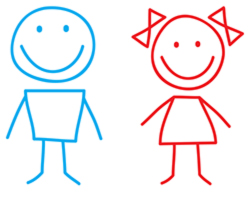
One of the main premises behind my blog is, when it comes to relationships most of us have NO IDEA what we are doing.
Sure, we learn some simple things like the golden rule when we are kids.
Beyond that though?
What do we really learn?
Most of us don’t learn how to deal with conflict. In fact, we’re taught that conflict is bad and something to be avoided. Because conflict means there are problems, and problems aren’t good, right?
So most of us spend our whole lives avoiding conflict even when that means the problems we have in our relationships go unresolved (including the ones that could often easily be resolved if we would just face them).
Thing is, conflict isn’t actually bad it’s simply the collision of two differing viewpoints. Often neither of those viewpoints is right or wrong – they are just different approaches to things. And taking the time to understand and accept each other’s viewpoints is a part of learning to love and accept each other for who we are (instead of focusing on who we aren’t).
Sadly, we don’t learn that – no one teaches it to us. And if/when we DO learn it it’s often through trial and error, and only after a considerable amount of pain and heartache.
Another thing we commonly don’t learn about is how to say no.
Giving and Taking
In my last post I talked a bit about the end of my marriage, and how one of the most important things I learned about was the importance of boundaries.
Boundaries are a difficult concept. What exactly are they, and how do we learn them?
Unfortunately, similar to how I came to the realization that conflict was positive and healthy (when done right), learning about boundaries often involves a lot of pain and heartache too.
Growing up, my one rule on relationships was the golden rule.
Do unto others as you would have them do unto you.
Treat others the way you want to be treated.
I think I learned it somewhere around grade two, and it became the foundation of all relationships.
I like it when people are kind to me, so it made sense that I needed to try and be kind to them. Being kind or nice is a good thing. Being giving to other people is a good thing. So it seemed clear that that was the right way to live your life.
But there was one problem here.
When you are willing to give, you will ALWAYS find people who are willing to take.
Being nice and kind is good, but unfortunately it opens you up to being taken advantage of. And commonly we aren’t taught how to deal with being taken advantage of.
We aren’t taught how to say no.

Learning To Say No
As children all we understand is our needs. We want something, and we either get it or we don’t. Hopefully we learn that we won’t always get what we want, and that’s alright.
I’m a parent, and trying to teach that can be a challenge. There are times that my kids have tantrums (which are really just a form of trying to get control), and those tantrums can be emotionally draining. Sometimes during those moments it can be tempting to just give in and give my child what he wants. When we do that, part of us knows we are showing them that tantrums work. That if they make a big enough fuss they will get what they want. But we know that with children we NEED to say no to them because that’s how they learn.
We set down rules and we expect our children to follow them. After all, we are the parent and they are the child, and we know those rules will benefit them in the long run, and in fact are important to their development.
For some reason we don’t do this in adult relationships (both friendships and romantic relationships). In adult relationships, people are adults and we expect them to behave as such. So we don’t create rules, because we don’t think we should have to. And further, we probably don’t even know what the rules should be.
We don’t know what our own boundaries are.
We only start to learn them when they are violated.
We only start to understand our boundaries when someone says or does something that hurts us. When we feel belittled, or disrespected, or even just ignored. When we don’t feel valued, or heard.
These are the moments that we start to learn what our boundaries are.
These are the moments when we need to start to push back and say no, or say hey, you’re hurting me here.
But often we don’t.
For many years I didn’t know what my own boundaries were. I didn’t learn to say no. And I suspect I’m not alone in this.
I was taught to give, and to treat others well (how well I succeed in that is a fair question). Because of this when I was hurt by someone I loved I didn’t know what to do. I didn’t know how to deal with it.
I saw conflict as bad, so I would just accept certain things. Or I would make excuses for them. Things like “oh, he/she did this – but they were having a bad day so it’s alright”. I would let things go, rather than having them turn into a fight. Because it wasn’t worth a fight, right? And when you loved someone, did the little things really matter?
That’s what I believed, but I was wrong.
In allowing certain things, I was saying these things were alright. In trying to be kind, I was enabling poor behavior.
And I wasn’t respecting myself.

Boundaries are hard; and when you haven’t being enforcing them and you start to, people can accuse you of being selfish. That accusation can sting, because at first it DOES feel selfish. When you’ve spent a long time focusing more on the needs of others, trying to understand and enforce your own boundaries them and enforce them doesn’t feel right.
Saying “No” to someone isn’t easy. Saying “hey, when you did this you hurt me” isn’t easy.
But sometimes, it’s necessary.
It’s important to remember that standing up for you isn’t selfish. I think this sums it up well:

To me it’s about balance. If you always put yourself first, then yeah, you are probably selfish.
If you are in a relationship the other person HAS to be important. Their needs have to be important to you. It can’t ever be just about one person, both people always need to matter.
Discovering You
Understanding your own boundaries is about learning what your core values are.
What TRULY matters to you? What are your NEEDS, and not just your wants (at first the line between this things can seem very blurry)? How do you need other people to treat you and interact with you? What do you need to feel valued, and respected?
Once you understand this, how do you go about enforcing them and ensuring they are being respected?
I think understanding this is a long process, and is part of our own personal journey. It’s part of defining who exactly we are as a person, and I don’t think we learn this easily.
Further, I think not understanding it or enforcing it is a large part of why many people find themselves in unhealthy relationships.
Often marriages or long term relationships start in our twenties, before we really know who we are yet. We don’t know our boundaries, and we don’t know how to enforce them.
If we are lucky, we have sufficient communication skills that we are able to grow together as a couple. Learning who we are, establishing and communicating boundaries and, and continuing to accept and still love each other as we grow.
Unfortunately, that’s not always the case.
In learning yourself and your boundaries you may find that your partner doesn’t respect them, and isn’t interested in doing so.
When this happens you face a difficult decision.
Because sometimes, as difficult as it may be the only way to respect yourself is to accept that the relationship you are in no longer works.
Relationships require reciprocity. And if someone is unable to respect your boundaries, then they don’t respect you. At that point you need to ask, does that person really want to share their life with you or are they primarily interested in having someone take care of them and meet their needs?
Both people need to be respected.
Both people need to be valued, and heard.
Both peoples boundaries matter.
If they don’t? Then it’s not a relationship.
























